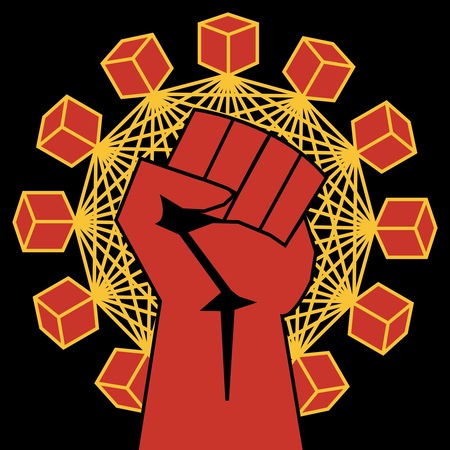I’m going to keep this short but I just fell down the rabbithole of crypto again and maybe it isn’t as bad as I thought. Many of their ideas are very similar to the fediverse’s. The idea of decentralized finance using a stablecoin sounds awesome to me. (though i’d much prefer to live in a world where money isn’t needed) Maybe the technology is actually good but the techbros and scammers ruin it with their false promises and complicated words. Hopefully, in a few years after the rest of those scammers have moved on to scamming with AI this tech could be truly used for meaningful purposes.

Nah man, crypto was built in the circles of libertarian goldbugs in an attempt to privatize the dollar. Ultimately the aim of crypto is the opposite of the fediverse: to take away (theoretically) popular control of the dollar and throw it into corporate hands.
Can I have a source for that? That doesn’t seem to be the case.

The source is me. I’ve been following through somethingawful’s buttcoin thread since 2011 and then on and off through political subreddits. One of the biggest things is that they HATED government-backed “fiat” currency and saw bitcoin as a replacement for the dollar (Even though bitcoin is also fiat and had notorious stealing issues and was just as unstable then as it is now)

well, fiat money is issued by a central authority and its value depends entirely on the faith people have in that central authority. Compare that to monetary systems based on the gold standard, where a unit of currency has a fixed value in terms of gold. When the dollar followed the gold standard, it was technically possible to exchange dollars at the bank for a fixed amount of gold. While with fiat, you could say that the market decides how much gold one dollar is worth.
Bitcoin and other cryptocurrencies are more like gold or silver than they are dollars or euros or whatever other fiat currency. The value that gold itself has is determined by a lot of things, but ultimately it comes from its rarity. You can if you want go out into the hills and spend time and energy digging up gold. Likewise, you can if you want spend time and energy mining bitcoin. This is why people often say bitcoin is digital gold - it’s rare and it takes time and energy to find.

Gold is a fiat currency. There are things that are far rarer and harder to extract that are worth far less. Sure, the metal itself has some intrinsic uses, but that’s not where most of its value as a currency comes from. It’s just pretty and lasts a long time, so we decided it made a good currency. That’s still an arbitrary decision, and if we collectively decide we don’t care about that anymore its really not worth much more than copper is for its usefulness and rarity. It’s valuable because it is the original fiat currency.

No that’s not it, sorry. If you’re genuinely interested in the actual meaning of fiat, and how it’s different to currency that is pegged to a fixed quantity of some precious resource, a good place to start is wikipedia. One important distinction is that fiat money can be created or destroyed at the issuer’s discretion. This is a big part of why most governments left the gold standard in the 20th century, and a big part of the motivation behind bitcoin and other cryptocurrencies.
Fair enough

You are insane lol

Doesn’t seem that insane to me. Crypto has been intertwined with various scams throughout its history and as far as I’ve heard, the very founders of the idea are pretty shady characters themselves. Not sure to what degree @king_dead@beehaw.org is right, but I don’t see a reason to ever give crypto the benefit of the doubt at this point.

Where is monero in the hands of corporate?

In my opinion, the idea of crypto/blockchain is fairly naïve unfortunately.
Crypto/blockchain is not truly decentralized; the developers of the chain and its protocol retain total control over it in a similar manner to governments over their own currencies. They can invalidate old coins, issue new ones, debase the currency – whatever they want.
What is decentralized is the ledger itself, in that the database of the chain is distributed across many computing nodes. This is in fact bad because it results in:
- Slowness in processing. This is why BTC transactions take so long to settle.
- Potential foreign control of the database. An attacker who exploits a flaw in the protocol, or a miner that has a majority of the blockchain under their processing power, can rewrite the ledger however they want. They can double spend coins, revoke transactions, or … well, anything.
- Automated contract resolution. This is bad because contracts are (and have been) exploited on every blockchain to drain legitimate wallets of funds – either because the contracts themselves are badly written, or the software they’re implemented in is easily-exploitable.
Overall a centralized ledger would be a far better idea for most blockchains than a distributed one… controlled by a trusted entity, rather than a bunch of crypto devs… with human oversight instead of automated contract resolution…
And we’ve just invented actual currencies.

Yes. Blockchains will only remain as decentralized as their underlying incentive structure. In the case of Bitcoin, it turns out that form of “proof-of-work” was subject to Capitalism Attack. That is, there was someone with enough capital to commission the design and manufacture of highly specialized silicon, and their resulting competitive advantage led to the network consolidation we see today: specialized machines competing for who can burn the most electricity.
Ethereum fucked up in a different way. They did learn from Bitcoin’s weakness, and switched from an “open” proof-of-work blockchain to a “closed” proof-of-stake system …
… once again facilitating Capital Attack. Because who can buy the biggest stake? Yeah.
Once again, market forces (combined with extremely dubious design choices in their smart contract API) led to the centralized garbage we see today.
But it is possible to redirect the Capital Attack, judo style, and render it impotent. Look into “proof of space and time” if you’re interested in learning more. Carefully aligned incentives and weaponized Scaling Challenges can give the little guy a chance and send the Big Capital Gang back to their dirty-tricks drawing board.

But what would be the trusted entity

You sound like you wouldn’t like rust.

The programming language? I like it just fine, I prefer Go but Rust is great too.

I would say that the Fediverse, Lemmy, Etc. are diametrically opposed to blockchain in the way each approaches decentralization.
The blockchain/crypto, tries to “solve” decentralization by creating a trustless database that nobody can own. It assumes that the technology is perfect software, executing the same code for everyone, equally, without outside interference. It requires all users to be equal, that any changes be made in the interest of the collective.
What actually happens, especially as you scale up, is that early investors are disproportionately valued, while wealthy investors can dump tons of money into mining. These stakeholders then expect a profit in return, and the loop of enshittification begins. The stakeholders can apply pressure to fork or update the blockchain in ways that favor them, and normal people have no recourse to do anything.
Blockchain is also, by design, incredibly inefficient. Bitcoin, which caps at 7 transactions per second, cannot scale to any meaningful, and require third-party exchanges to perform transactions OFF the blockchain taking a cut of the cost in the process. The various proof-of-stake can achieve reasonable TPS rates, but also require a third-party to provide collateral, which again gives them power over the platform. And sure, you could make your own small cryptocurrency, but to federatate your coin to other coins you still need a third-party exchange!
The Fediverse, by contrast, is based on the idea of Free and Open-Source Software (FOSS). It thinks that private, for-profit entities shouldn’t control public resources, and that technology is best when it is transparent and accessible to everyone. Here, decentralization is a tool. While ActivityPub (the technology behind the Fediverse) is decentralized in implementation, the standard is maintained by a central governing body (the W3C, an international non-profit consortium).
Another difference is that ActivityPub isn’t “trustless” like blockchain. On a Fediverse social media platform, like Lemmy, each server is an independent central authority, a unique database of users, posts, and interactions. Rules and decisions are governed by their administrators, and the moderators they appoint. It only achieves decentralization by allowing these servers to federate by (and this is key) trusting other servers. Trust is the default, which is antithetical to the blockchain. Admins can then revoke trust for malicious actors. You can see this happening now on Mastodon with the news about Meta joining the Fediverse, the Fediverse Pact, and the ripple affects on mstdn.social and mastodon.art.
Blockchain ultimately fails as a technology because the core assumption it makes is flawed. A truly trustless system cannot exist. You trust the programmers who make a blockchain or ActivityPub that their source code does what it says it does, and they haven’t secretly modified anything. You have to trust the third-parties that make crypto exchanges and Lemmy instances with your personal data and to operate as promised. You have to trust the other users you send money to or reply to in the comments. By viewing “decentralization” as the solution and “trust” as the problem, blockchain dooms itself to never accomplish anything of value.

The actual idea of crypto is reaaallly cool: a decentralized trust system that enables incredibly difficult to fake transactions and records without the need for a trusted third party.
Unfortunately a lot of the implementations relied on ‘capital’ as the proof of trust - GPU work (money) and number of controlled instances (money) are two big ones. Which really all led them down the path of ____coin which is fundamentally incompatible with the ideal of ‘no third party can govern trust’ because suddenly whichever party that has all the proof of trust is now the third party that can govern trust and approve transactions. Someone can own a ___coin.
Crypto could have been a decentralised system that can keep public records, documents, ideas, etc. - it can guarantee authorship and date if a user is willing to submit identity information. Lots of actually useful functions!

There are a lot of documents that would be good to “falsify” though - I know I’d like to not have my birth name all over “unfalsifiable” document histories.

Highly understandable, and a really good point to bring up - there should be some way to relink history if you end up changing your birth name or any other ID so that your current identity is associated with historic documents. Git does this pretty well in fact, and that’s probably a model that could actually be applied to a ‘reasonable’ blockchain system.
I don’t particularly love having my birth name associated with all of my documents either, but if I could update my ID with a transaction and have it be linked to all my historic documents, I personally would find that an acceptable solution.
Exactly!

don’t waste your time, the scammers have polluted peoples ideals on it for the time being. can’t say i blame them. Next round will be national ids and regulated trading channels, the users won’t even know or care that it’s blockchain.
people don’t care about the database, just make it work.
For the time being, yes. However, the underlying tech is based on good ideas and maybe in the future it can and will be used.

i agree, i work in the industry, but bringing it up on socials outside of crypto communities has been just a way to get flamed of late.
people are angry I understand and others just really love thinking they have ahigh horse based on headlines.
im just building now, everyone will be crazy for it again in a year.

What good ideas, specifically?

A blockchain with an appropriate consensus protocol is like implementing a globally shared spreadsheet where nobody can alter history.
The types of things a decentralized globally shared spreadsheet that can be trusted allow are amazing and it’s up to us how we use this potentially world changing tool. But like any tool, including the dollar, it’s also useful to those with malicious intention.
It’s still the early days for this technology.
What I find odd is that people expect a tool as powerful as blockchain to be somehow without crime and all the bad stuff that plagues everything else in life.
Well obviously it’s going to have issues but at this point it feels like there’s more bad actors than good. Eventually it’ll balance out but for now…

I’ve yet to see a single killer use case for crypto. As for the fediverse, well here we are!

Entertainment is a pretty good use case! Although I’d take it not existing at all as a preferred option.

I think most stablecoins are a bad idea as they require a trusted third party such as paxos, circle, binance, etc that can be pressured to freeze your funds by governmyths. I personally use monero to make transactions
Some don’t.

Yea idea of it is awesome, but sadly unrealistic
Maybe i’m naive but I have some hope that after a couple years the whole thing will be forgotten by the techbros and could be used by normal people.

Not until it solves a problem for less money than existing solutions and faster. Last time I tried it cost 15 dollars to move 30 dollars in etherium, and took 5 minutes or so.
Oof that’s rough. How long ago was that. The problem it solves for me is the control that rich people and the federal reserve have over my finances. I’d rather it all be done in a decentralized way.

Well, that problem cant be solved in capitalism, which is problematic
Sure, i’d prefer to live in an anarchist society but atm (sadly) we don’t. We can try to tame capitalism into something less corrupt while we’re here though.

Check out the Gamestop wallet.
I think layer 1 protocols like Ethereum are not appropriate for small money transfer, that activity should occur on layer 2 roll ups, it’s far faster, cheaper, and more efficient. Only use offramp to fiat or L1 if you need to.

Same

stablecoins aren’t really decentralized in any meaningful sense. a traditional stablecoin requires complete trust in the centralized organization that claims to hold the money and can print any amount of coins they want, while an algorithmic stablecoin is even worse since they by design are doomed to doomspiral as every major algorithmic stablecoin in existence has done so far

